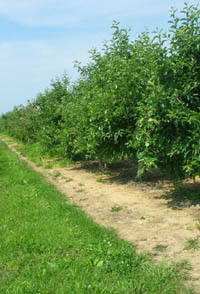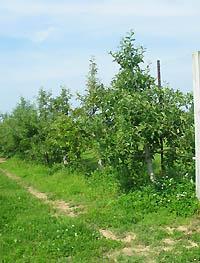Herbicide Research Aimed Saving Time
Herbicide Research Aimed Saving Time

Springtime is hectic in vineyards and orchards, but research being conducted at the University of Kentucky College of Agriculture’s Research and Education Center is aimed at reducing the busy load.
For two years, UK horticulture specialist Joe Masabni has been researching fall residual herbicide applications as a way to eliminate the need for applying the chemicals during the spring rush. The results can easily be seen.  Fall herbicides can be applied as long as the ground temperature is above 45 degrees and there is no snow on the ground and the ground is not frozen, he said. Two years ago, the applications were made in September, but a lot of growers are still busy selling their fruit at that time. So in 2005 he delayed application and found he could wait until Dec. 17 in western Kentucky – a time when growers are much less preoccupied with other responsibilities. Timing will differ year to year but as long as the proper conditions are in place, successful applications can be made.
Fall herbicides can be applied as long as the ground temperature is above 45 degrees and there is no snow on the ground and the ground is not frozen, he said. Two years ago, the applications were made in September, but a lot of growers are still busy selling their fruit at that time. So in 2005 he delayed application and found he could wait until Dec. 17 in western Kentucky – a time when growers are much less preoccupied with other responsibilities. Timing will differ year to year but as long as the proper conditions are in place, successful applications can be made.
Masabni used three residual herbicides – Chateau, Gallery and Caseron – in replicated plots with a control plot using Roundup®. The experiment was conducted on peaches, apples and grapes. All the plots showed positive results, but the Chateau herbicide plots showed significantly less weeds five months after application. Fall applications of Roundup®, which has no residual activity, will control difficult weeds in the fall but will have no further benefit when the weather warms up in the spring, he said.
“We have done all the pruning, pesticides spraying and even the thinning without having to worry about applying an herbicide,” he said. “And that’s the purpose of this study. If you apply your herbicide in the fall when you have more time, then you don’t have to worry about it in the spring. You’ve taken one chore out of your list.”
Masabni said he can reduce the need for herbicide applications to three and possibly two a year using this system. Some growers using chemicals that have no residual effects are spraying up to six times a season. While these chemicals may be cheaper, the additional sprays mean more fuel consumption and time spent away from doing other chores, he said.
“I tell all my growers that weed control should be the least of their concern,” he said. “Disease and insect control should be the priority. Hopefully, this system will allow them to spend less time worrying about weeds and their control.”
